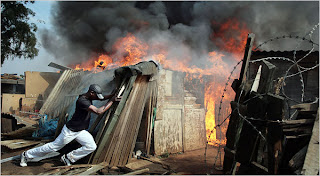South Africa: The end of the rainbow nation?

The Canberra Times, May 24, 2008
It shouldn't surprise us that South Africa's townships are embroiled in fresh violence. Apartheid was South Africa's Berlin Wall. It was the great divider. With its passing, poor black South Africans, accustomed to prejudice but more disaffected, have turned on those they think are robbing them of better lives.
This past week dozens of foreigners, other Africans, have been killed by South Africa's poor. Tens of thousands more have fled into refugee shelters since the violence began earlier this month in the Johannesburg township of Alexandra. Locals with the support of trade unions and some sections of the media accuse outsiders of stealing jobs and fueling a spate of crime. The tensions have been there for years.
But what is surprising is the intensity and rapidity of the violence. Opportunistic mobs have raped women and burnt former neighbours to death. The xenophobic violence has spread from poor areas of Johannesburg to Cape Town and Durban, South Africa's third-largest city. It has been fanned by locals with nothing else to do and hammer-wielding gangsters ready to exploit them.
Have foreigners brought South Africa a new wave of crime?
Certainly immigration has bought new TYPES of crime such banking fraud - not seen in South Africa during apartheid. But foreigners are still more likely to be victims of crime than perpetrators.
The country has a population of 50 million and is home to an estimated five million immigrants. Most are from Zimbabwe, having fled persecution and terror under Robert Mugabe. They are now the target of a new atrocity. In recent days hundreds have been preparing to go home, preferring to risk violence in an impoverished Zimbabwe than stay in South Africa. Immigrants from Mozambique are heading for the borders as well.
President Thabo Mbeki must accept his share of the blame. Mbeki's “softly, softly” approach with Zimbabwe's despot Mugabe has done too little to end the crisis or to stem the flow of migrants. Further, he has done nothing to provide assistance to refugees from Zimbabwe while at the same time presiding over one of the world's most liberal immigration and refugee policies. Instead of being integrated foreigners have been marginalised and seen as a threat.
South Africa was largely sheltered from mass immigration during apartheid although the country did allow black foreigners to work in the mines in shocking conditions. But they could not formally immigrate. It was the law.
By contrast, during apartheid many black South Africans migrated north into other countries of Africa as political exiles. Thousands of South African 'freedom fighters', including Mbeki's touted successor Jacob Zuma, were sheltered in Tanzania, Mozambique, Zambia and Zimbabwe. They were given food and education and even arms to fight the white regime, to the point where some of these governments were on the brink of bankruptcy. Today, black South Africans are unable to be as generous to exiles as their brothers were to their liberation fathers.
In South Africa, as elsewhere in the world, immigration has, in fact, been good for the economy. There is a huge skills gap as a result of apartheid's disrupted education system. Foreigners have filled that gap. They have started businesses and created jobs. More educated new arrivals have accepted low-class jobs in homes and on farms for far less money.
Commentators are urging the government to embark on an aggressive program that promotes the integration of foreigners. It is fundamental government provide them and disaffected South Africans with basic services, better housing and many more jobs. While the minerals boom has ensured that some South Africans are doing well, the promises that were made with the end of apartheid have not materialised for millions of the poor. Their shanty towns have grown even bigger.
Too much is at stake. The unrest threatens to increase political instability at a time when there is already fury over electricity shortages and rising inflation. The poor feel betrayed by President Mbeki's pro-business policies.
Some South Africans fear this is the perfect storm. The black elite may be the next target of the disaffected, followed by the other minor races of a once heralded rainbow nation. Dormant hatred by blacks of their 'coloured' and Indian neighbours, a feeling mutually held, may rise to the surface.
A friend of mine now settled in Australia as a refugee had once sought shelter in South Africa from political persecution.
He tells me now that the dream of an African Renaissance (a term coined by Mbeki to mean social cohesion, democracy, economic rebuilding and growth, and the establishment of Africa as a significant player in geopolitical affairs) is dead, and it pains him. He believes we are seeing the emergence of a criminal state where a future government will have no real authority but be compromised by organised crime.
But, for now, there are signs of hope. Churches and agencies have come together to assist the displaced. There are rallies planned to protest against xenophobia and hate crimes. Senior government ministers are finally talking about causes and solutions; about the dangers of economic envy and the need to address South Africa's chronic skills shortage.
Xenophobia and the complex issues underlying it are on the agenda, but have come, sadly, at a heavy human cost.



Comments
Julie
This color issue is always so complex, but you always do a good job of breaking it down.
Shelton